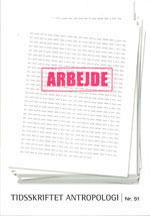ARBEJDE ER LIVET: Refleksioner over „det grænseløse arbejde“
DOI:
https://doi.org/10.7146/ta.v0i51.106705Resumé
The boundaries between working life and other life are shifting. The post-modern
employee has become personally responsible for organising his own work in both time
and space. This may lead to the experience of increased mobility between working life
and other life. Flexible working hours, as well as an overlap between working activities
and leisure activities, veil the distinction between working time and other time. Furthermore,
individuals experience time differently, connecting time not only to linearity but
also to events and tasks at work. The physical frames of work are also undergoing
dramatic changes. New technologies enable the individual to carry out his job anywhere
and at any time. Work is not only performed at specific workplaces, but also at home,
in trains, planes - almost anywhere. As such tasks, rather than time and place, have
become the organising principle when it comes to the relationship between working
life and other life. And task-orientation makes it difficult to distinguish between the
categories “working life” and “other life” in practice. In fact, work is not just a part of
life. Work becomes life, just as life becomes work.
Downloads
Publiceret
Citation/Eksport
Nummer
Sektion
Licens
Ophavsretten til artiklerne i Tidsskriftet Antropologi tilfalder forfatteren.
Artikler publiceret i Tidsskriftet Antropologi må citeres, downloades og videresendes for ikke-kommerciel brug, under forudsætning af normal akademisk reference til forfatter(e) samt tidsskrift, årgang, nummer og sider. Artiklerne må kun genudgives med eksplicit tilladelse fra forfatter(e) og tidsskriftet.


